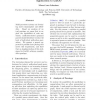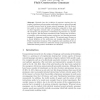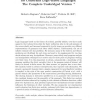415 search results - page 6 / 83 » Tree Unification Grammar |
ACL
2001
13 years 10 months ago
2001
Current alternatives for language modeling are statistical techniques based on large amounts of training data, and hand-crafted context-free or finite-state grammars that are diff...
ACL
2001
13 years 10 months ago
2001
Multi-processor systems are becoming more commonplace and affordable. Based on analyses of actual parsings, we argue that to exploit the capabilities of such machines, unification...
EELC
2006
14 years 13 days ago
2006
Research into the evolution of grammar requires that we employ formalisms and processing mechanisms that are powerful enough to handle features found in human natural languages. Bu...
ACL
1990
13 years 10 months ago
1990
In this paper, we report on our use of zero morphemes in Unification-Based Combinatory Categorial Grammar. After illustrating the benefits of this approach with several examples, ...
CORR
2004
Springer
13 years 8 months ago
2004
Springer
Logic languages based on the theory of rational, possibly infinite, trees have much appeal in that rational trees allow for faster unification (due to the safe omission of the occ...



